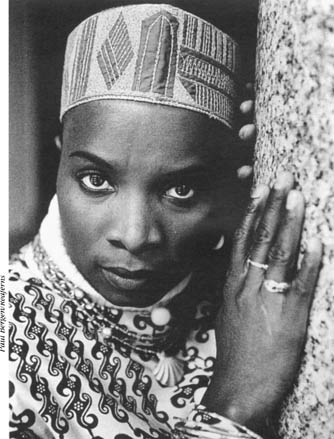
Benin’s exotic export Angélique Kidjo combines an immensely powerful voice with an uncompromising attitude that has earned her the nickname “she devil.”
Angélique Kidjo is a West African singer and songwriter whose penchant for fusion has made her a commercially successful global crossover artist. The “African funk diva of world music” mixes traditional rhythms with Western electronic dance sounds, attracting criticism from African music “purists” and praise from dance-hall patrons worldwide.
One of nine children, Kidjo was born in I960 in Ouidah, the voodoo centre of Benin. Her musician father owned a photography store and her mother ran a ballet troupe, in which Kidjo acted and danced from the age of six. As a child, she sang both voodoo-influenced folk music and church music, and sang along to BEATLES songs, adding her own lyrics i n her native language of Fon. In her teens, she moved on to performing with her older siblings in the Kidjo Brothers Band, and later joined the group Sphinx. By the age of 20, she had become one of Benin’s few professional female vocalists, recording for Benin radio, and with several local hits to her name.

Benin’s exotic export Angélique Kidjo combines an immensely powerful voice with an uncompromising attitude that has earned her the nickname “she devil.”
In 1983, Kidjo left the artistic constraints of Benin’s dictatorship for the vibrant, experimental music scene of Paris. Originally studying law, she soon undertook formal studies of French song and classical music. Her two years of jazz training under singer Joy Kane are credited with cultivating her strong, low voice, and fine-tuned precision and rhythm. Within five years Kidjo climbed from backing singer to leader of her own band. In 1987, she met Jean Hebrail, her future husband and co-producer. By the end of the 1980s, she had toured West Africa with Radio France, cut several albums, and opened for her role model, Miriam Makeba, in South Africa.
Kidjo’s international stardom came in 1991, when Mango Records released Logozo, an album featuring her with jazz fusion artists including Ray Lema, Wall Badarou, and Branford Marsalis. Kidjo’s songs deal with love, poverty, nationhood, and oppression, melding traditional African sounds with reggae, jazz, hip-hop, and more. Apart from her own albums, Kidjo has lent her vocals and percussion to artists like King Sunny Ade and Jean-Luc Ponty. In 1996, she returned briefly to Benin to record rural drummers as backing for her album Fifa.
Kidjo still sings in her native dialect, Fon, a tonal language that necessarily influences the melody. “My art is about bringing people together,” she says. “It doesn’t matter what language you speak. The emotion is something beyond your brain.” In mid- 1998, she released Oremi, the first album of a proposed musical trilogy exploring the African roots of New World black music.
Brett Allan King
SEE ALSO:
AFRICA; FUNK; REGGAE.
FURTHER READING
Ewens, Graeme. Africa O-Ye
(London: Guinness Publishing, 1991).
SUGGESTED LISTENING
Ayé; Fifa;
Logozo; Oremi.